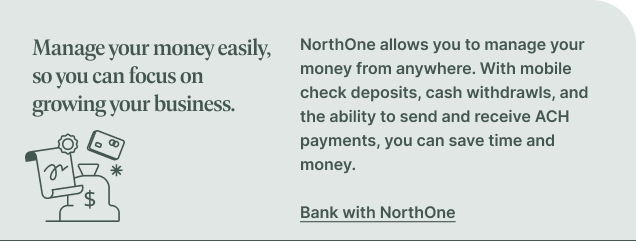Share this
Can You Use a Personal Account for Business?
by Fundid on Nov 22, 2021 9:30:00 AM
If you’re looking to start a new business, you should recognize the importance of separating personal and business finances.
Although it’s possible to open a business using a personal account, there are risks and complications when you associate your private funds with business funds. It also depends on which type of business entity you plan on opening.
However, we highly recommend creating a separate business bank account rather than using your personal account.
Let’s look at why.
Can I Use My Personal Bank Account for Business?
The most common business entities are sole proprietorships, LLCs, and corporations. Sole proprietors aren’t legally required to open a business bank account, so using a personal bank account for sole proprietorships is allowed.
However, it isn’t recommended, and your bank may not allow personal bank accounts to be used for business transactions.
If you have an LLC or corporation, you are legally required to keep your company's finances and your personal finances separate. Although this doesn’t technically mean you need a business bank account, it’s the most optimal solution.
Furthermore, some banks may require doing so if you’re applying as a corporation or LLC. So if you're asking the question, “can you use a personal account for business?” It is allowed for sole proprietorships but not permitted for LLCs and corporations.
Advantages of Using a Personal Account for Business
If you’re asking, “can I use my personal bank account for businesses,” you should know the advantages of doing so.
One advantage of using a personal account for business is that you won’t have to spend time creating a business bank account. However, the time you saved by not opening a business checking account is quickly surpassed by the amount of time you spend managing your taxes.
Additionally, personal checking accounts are usually free or have minimal fees. On the other hand, business checking accounts typically require you to maintain a certain balance in the account to avoid monthly maintenance fees.
Using a Personal Account vs. a Business Bank Account
A business bank account is used to help business owners separate their finances. Although they work similarly to personal checking accounts, they usually have different fees, balance requirements, and limitations.
However, keeping your personal finances separated from your company's finances is essential for tax purposes and managing your cash flow. With your business checking account, there will be a variety of different transactions, including:
- Making tax payments
- Paying suppliers
- Depositing payments from your customers
- Paying operation expenses
- Making necessary business purchases
- Paying your employees
If you’re using your personal bank account to manage all of these finances, separating these expenses from your personal expenses will be difficult.
We highly recommend every business owner use a separate business bank account. Business checking accounts allow you to protect your personal assets and make bookkeeping exponentially more efficient.
Why Your Business Would Benefit from Having a Separate Bank Account
When it comes to the question “should you use a personal account for business,” the answer is usually no. Let’s discuss all of the advantages that a business bank account offers.
Tax Simplification
When tax season arrives, businesses that use a personal account need to separate all their business finances from their personal finances. Depending on how many transactions there were, this could take up to a few weeks.
Even more, it will be challenging to be completely accurate. You could miss crucial money-saving deductions as you’re trying to separate the account’s finances. Creating a business bank account is essential for fast taxes with no errors.
It only takes a few trips to your bank to create a business bank account and saves you a lot of time and potential stress later on.
Most importantly, having a separate bank account makes your business less likely to get audited by the IRS. If you do get audited, it will be much easier for them to conduct their investigation.
Limited Liability Protection
When you’re opening up a new LLC or corporation, the main advantage it offers you is legal protection. Business bank accounts increase this protection by keeping your funds separate from your business funds. Your assets are protected if anybody tries to sue your business.
However, using a personal account for business potentially forgoes the legal protection you receive from your business entity. Since it won’t look like you’re running a separate entity, a court could also go after your finances.
If you’re asking, “can you use a personal account for business” you’ll be potentially forfeiting any legal protection your entity provides.
Performance Tracking
Using a separate account for your business allows you to see how your business is performing. You can easily track your monthly revenue, costs, and other information to make changes to better your business.
If you are looking for accounting software that's easy to use Quickbooks is a great tool to keep all of your expenses and revenue organized.
Professionalism
Using a business checking account makes your business look more legitimate and credible. Your customers and clients will be more likely to trust you if the payments and invoices come from a bank account under your company's name.
Furthermore, you may need a business bank account with a credit score and credit rating. These will be used to verify the legitimacy of your business if you’re applying for a business loan or credit card.
Credit Options
You won’t be able to accept credit card payments without a separate business bank account. This limitation can drastically decrease the amount of potential revenue your business can generate.
So if you’re asking, “can you use a personal account for business” and want to accept credit cards, the answer is no.
What Do You Need to Open a Business Bank Account?
Another significant difference between business and personal bank accounts are the eligibility requirements and application process. While just about anybody can open a personal bank account, you’ll need additional documentation if you want to open a business bank account, including:
- State-issued ID
- Social Security Number (if you’re a sole proprietor)
- Employer Identification Number
- Business license, and Articles of Organization (for LLCs)
- Articles of Incorporation (for corporations)
This list is not conclusive, and you’ll need to check the exact documents your bank needs for the specific business entity you’re opening. Sole proprietors will usually only provide their personal information, while LLCs and corporations need business documentation.
Do I Need Revenue to Open a Business Bank Account?
When you’re opening a business bank account, you don’t need to have any revenue yet. We recommend opening a business bank account before your business begins selling. You’ll be able to keep your business finances and personal finances separated from the start.
What to Look for in a Business Checking Account
When you’re opening a business account, pay attention to:
Low Fees
Business checking account fees are higher than personal checking fees. For this reason, you want to avoid high monthly fees as much as possible. Make a list of a few potential options and see which account offers the lowest fees.
Low Minimum Opening Deposit
The majority of business checking accounts have a minimum opening deposit requirement. Although they are usually low, it’s something you want to consider if you don’t have any revenue or a lot of capital to fund the account.
Low Minimum Balance Requirements
Some business checking accounts allow you to waive monthly maintenance fees if you maintain a certain average daily balance. We recommend looking for accounts with balance requirements you can meet.
Can You Use Business Funds for Personal Use?
Business owners should never use their business bank account for personal expenses. Doing so can lead to legal, operational, and tax issues. If you feel like you would to talk to someone about your business next steps, feel free to sign up on Bench and get started today talking to an advisor.
Grow Your Business With Fundid Today
Need funding to grow your business? Get loan offers that meet your specific business needs from several funders through Fundid Capital. Complete your application in as little as 15 minutes and work with a Fundid Advisor to pick the solution that works best for your growth goals. Explore your options.

